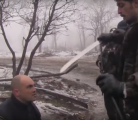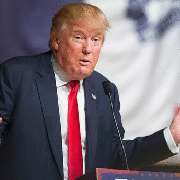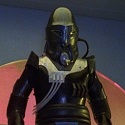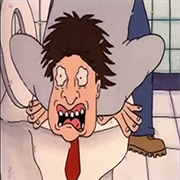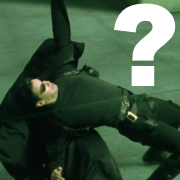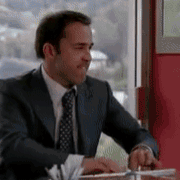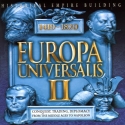|
Terrifying Effigies posted:Yeah, Norton didn't really seem that into it, although it's made up for by Brody's best SS Officer impersonation and Dafoe gnawing all the scenery as a literal gargoyle. The two of them made me want to see Anderson try his hand at a Universal Monsters and/or Addams Family style horror movie, everything involving the Desgoffe-und-Taxis family was fantastic. Both the casting and the acting felt quite phoned in at some points. Like why did they get Jason Schwartzman to play an East European lobby boy with an American accent?
|
|
|
|

|
| # ? Apr 27, 2024 03:35 |
|
scourgeofthe7bees posted:Yeah, this! Grand Budapest Hotel could've been ABOUT Zero and Gustave (and potentially Agatha), but Anderson chose to make it ABOUT the Boy With Apple caper instead, meaning it wasn't as good a movie as it could've been. I just thought this film was a beautiful package that's empty inside. The audience enjoyed it quite a bit more than other Andersons I've seen in the theater. Maybe because none of the characters are dealing with depression? Fiennes won over the crowd almost immediately and the film kept that momentum going.
|
|
|
|
scourgeofthe7bees posted:I thought the kid playing Zero and Ralph Fiennes were great in their roles, and I was so frustrated that the film squandered the opportunity to spend more time focusing on them, their fraternal relationship, and their standing in society instead of what amounted to a bunch of silly nonsense. Their relationship was 80% of the movie and basically wouldn't have existed without the 'silly nonsense.'
|
|
|
|
But Zero would've still been a lobby boy and Gustave's protege even if they didn't "steal" boy with apple (which really wratcheted up the silliness to 11). I dunno, I mean, you're right that the movie was mostly about the two of them, but it missed the boat somehow on making that as touching as it could've been.
|
|
|
|
The movie is entirely about Zero and Gustave. Which is why so many other characters simply pop in and out, they're tertiary. The painting is merely a MacGuffin, a spark to get the film going. Also, I loved that Adrien Brody's costume design made him look like some sort of Soviet assassin.
|
|
|
|
Chiming in to say I loved this movie even more than Moonrise Kingdom. There is such a refreshing "Why not?" spirit to Wes Anderson films lately that I adore, where there seem to be no rules or limits to what can happen and how it will be conveyed, and not in a self indulgent Lucas kind of way. I even like the way he uses cgi, where it seems like there will be one extremely obvious cgi scene in the movie that uses it in an endearing way not at all trying to be realistic.
|
|
|
|
TrixRabbi posted:The movie is entirely about Zero and Gustave. Which is why so many other characters simply pop in and out, they're tertiary. The painting is merely a MacGuffin, a spark to get the film going. I must not be explaining myself properly... The movie, which yes, was ENTIRELY ABOUT these two guys, crammed so much other stuff in in its efforts to be zany and madcap that it didn't do a good job of being about these two guys. Gustave's character arc was pretty much non-existent, Zero's is pretty minimal, and their relationship to each other didn't really change much from start to finish, resulting in the shifting of the film's focus onto the MacGuffin. They were both interesting and charming characters and I hoped for something like Bottle Rocket or Rushmore, in which the mentor/protege have ups and downs and the characters grow/change through turbulence, falling out, and reconciliation. The only reason I keep repeating myself here is that I think some people are confusing me with a moron who wasn't paying attention; in actuality, I've just got a different opinion than you do. EDIT: vvvvvv I think this dude gets me. scourgeofthe7bees fucked around with this message at 15:35 on Mar 23, 2014 |
|
|
|
Ralph Fiennes was the heart of this movie and continues Anderson's greatest tradition - writing captivating, endearing lead males aka Max Fisher, Herman Blume, Royal Tenenbaum, Zissou, also Dignan from Bottle Rocket and Sam from MK to a lesser extent. I didn't mind the whimsy of GBH but the early world building stuff was cluttered. I understand the device of story-telling shaping the movie but I truly feel MOST of the first 10 minutes were the most uninteresting of Anderson's career; mainly the Jude Law stuff, I liked girl-in-cemetery and Wilkinson's bit because it was succinct and evocative. I think my favorite gag in the whole film was Tom Wilkinson breaking when his kid approaches to shoot him off camera. Everything else pre-Gustave felt hollow and superfluous, which I think is the film's biggest flaw. Every person and place except Gustave and Zero were extremely facile and generalized, while intentional at times, worked to the film's detriment. Even Zero was considerably one-note, he mostly existed to give Gustave someone to react to (which is O.K.) but was a little flat and struck me as just an audience stand-in. I'm talking about character development, not his actual purpose in the plot. Also think Tony Revolori didn't pull off all of his lines, sometimes was a little awkward when had to talk with emotion like accusing Gustave of flirting or berating the new Lobby Boy. His best bits, acting-wise, were his brief interactions with Agatha. I still greatly enjoyed the film - there was a lot to love - like most of Gustave's dialogue or the lesbian painting and I want to see it again. However, I don't think Anderson emphasized the film's strengths - Fiennes' performance / the relationship between Gustave and Zero - and instead spent a little too much time on window dressing, including the shoehorned cameos. Also everyone is right about Ed Norton, he looked bored and wasn't acting. Miss Lonelyhearts fucked around with this message at 19:25 on Mar 23, 2014 |
|
|
|
Saw it last night. Liked it, but was not particularly impressed by the character development or plot. The film was cute, though -- a madcap adventure in the 30s like Tintin or Indiana Jones. The difference, I think, was how the very real spectres of fascism and racial violence were treated. Most Andersen films deal with the ennui associated with being an aristocrat -- but this film took the opposite approach. All the main characters loved the aristocracy, but they were all powerless to stop the march of the Nazi machine. The only non-Nazi character that didn't have to compromise anything essentially had to fully embrace violence to keep his agency (Wilhem Dafoe; Adrien Brody maintains the trappings of fascism, but in the end the Nazis are willing to violate the rule of law to uphold the aristocracy, the aristocracy no longer matters). The subtle, but direct implication of racial violence against Zero is interesting as well -- many WWII adventures and comedies do not seriously deal with the themes of violence and racism. Nazis are often just "bad guys." In the end, the aristocracy persists, but its real power is crushed by fascism and state-run communism. Admitting that the aristocracy can be defeated is an interesting turn for Andersen -- certainly something not addressed heavily by his work before.
|
|
|
|
scourgeofthe7bees posted:I must not be explaining myself properly... You are explaining yourself properly, people just disagree. I just got out of this film 10 minutes ago and I completely disagree that the zaniness took away from the characters. If anything it was these characters reacting to/causing the zaniness which gave them character. For example, Gustave's whole sequence in the prison, where it is his gentlemanly demeanor which gets him in with the escaping criminals as well as the tall scarred convict who covers for him. But this gentlemanly honor ultimately gets him killed by the Nazis when he tries to protect Zero at the end. Also, their relationship grows from mentor/mentee to equals over the course of the movie. I thought the movie was great, definitely Anderson's best in a good while. I will agree that he has gotten more whimsical post-Tenenbaums, but I think he has managed to balance that here better than he did in Mr. Fox and Moonrise at least.
|
|
|
|
Did no one else think it was weird how Zero changed races when he was older?
|
|
|
|
G-III posted:Defoe had some previous experience on his resume that gave him a leg up for the role: Glad someone else picked up on it! I laughed out loud at the vampiric framing of Defoe. The eye shadow, the creeping hunched shoulders, and I swear he had pointed teeth a few times. Total Count Orlok. cloudchamber posted:Both the casting and the acting felt quite phoned in at some points. Like why did they get Jason Schwartzman to play an East European lobby boy with an American accent? That was definitely intentional. Saoirse Ronan's accent was equally inexplicable, as was Ed Norton's, as was Harvey Keitel's, as was almost everyone's. We just weren't explicitly told they were supposed to be from a specific region like Schwartzman's character was. I thought having that bit set up that expectation for the rest of the film rather nicely- that we're witnessing someone staging the experience of reading a book, rather than witnessing the events of the book.
|
|
|
|
Guy A. Person posted:I thought the movie was great, definitely Anderson's best in a good while. I will agree that he has gotten more whimsical post-Tenenbaums, but I think he has managed to balance that here better than he did in Mr. Fox and Moonrise at least. While I agree with most people in this thread that this movie is among Anderson's most whimsical/cartoonish, it's also one of his darkest, especially if you consider all of the poo poo happening off screen.
|
|
|
|
I completely loved this movie. And I'd agree that while the vibrant/pastel palette, anachronistic charm and other standard Anderson whimsy made most of it liltingly light on the surface, there are dark undercurrents at work, both on and off screen. The film opening in a backdrop that looks like any one of a dozen real-world post-Soviet blocs - dingy, oppressive and bleak - combined with the bittersweet remembrances of both the writer (Jude Law) and the elderly Zero (F. Murray Abraham) make for what really amounts to a tale of a charming place in time, moreso than space, that can never be reclaimed. The last lines really did pull at my heartstrings a bit.
|
|
|
|
You know, I just realized I have never seen a Wes Anderson movie and now I want to know where to start. Was thinking of seeing Grand Budapest Hotel (trailer looked amazing) but don't know if there is anything else to ease me into Anderson's style because I'm hearing this is very potent Wes Anderson (a director's work being too strong is a disinterest to me).
|
|
|
|
Justin Godscock posted:You know, I just realized I have never seen a Wes Anderson movie and now I want to know where to start. Was thinking of seeing Grand Budapest Hotel (trailer looked amazing) but don't know if there is anything else to ease me into Anderson's style because I'm hearing this is very potent Wes Anderson (a director's work being too strong is a disinterest to me). I was in the same position and I enjoyed it well enough. Maybe not being familiar was a boon, since you can't get sick of a style you've never seen before.
|
|
|
|
Justin Godscock posted:You know, I just realized I have never seen a Wes Anderson movie and now I want to know where to start. Was thinking of seeing Grand Budapest Hotel (trailer looked amazing) but don't know if there is anything else to ease me into Anderson's style because I'm hearing this is very potent Wes Anderson (a director's work being too strong is a disinterest to me). I think it's a fine starting point. Other good jumping in films would be The Royal Tenenbaums, Rushmore, or Fantastic Mr. Fox.
|
|
|
|
I would recommend that anyone looking to get into Anderson should just watch all of his films chronologically. For me, Bottle Rocket is easily his weakest film but you can see the beginnings of his style in both framing and writing. You'll then be treated by Rushmore and Royal Tenenbaums which are both amazing films. What comes next is usually debated but I liked Life Aquatic and Darjeeling quite a lot. Fantastic Mr. Fox is one of my favorites but usually starts to lose me around the 2/3 mark. I felt Moonrise Kingdom was pretty overrated and I find myself very reluctant whenever consider watching it over again. I happen to think Budapest is his strongest films in a long time and consider it one of his best.
|
|
|
|
I have not seen this yet because it hasn't come to my area yet, but... I love the Wes Anderson Aesthetic and I think I will enjoy every movie he makes on a sincere level. But at the same time, I also think that he already made "The Definitive Wes Anderson Film" with The Royal Tenenbaums over a decade ago, and that ever since it has felt to me like there has been a certain... aimlessness or lack of focus to his films, like he knows he already did it so he is doing his thing and having fun with it.
|
|
|
|
Justin Godscock posted:You know, I just realized I have never seen a Wes Anderson movie and now I want to know where to start. Was thinking of seeing Grand Budapest Hotel (trailer looked amazing) but don't know if there is anything else to ease me into Anderson's style because I'm hearing this is very potent Wes Anderson (a director's work being too strong is a disinterest to me). I've seen a few other than this, but I wouldn't say that liking Grand Budapest automatically means you'll like his other films. Budapest was great and I enjoy Life Aquatic a lot as well, but most of the others (for me, at least) really fell flat. I'm so confused as to why it came out everywhere here in the UK but barely anywhere in the US!
|
|
|
|
Definitely don't skip Bottle Rocket, Rushmore, and Royal Tenenbaums; his other films all aspire to be these with varying degrees of success.
|
|
|
|
Taear posted:
As has been stated, the studio does a limited release with almost all his films, even Fantastic Mr. Fox. It sort of drives up demand. Release it in a few markets where it gets good word of mouth (In it's opening weekend, Grand Budapest made 800,000 dollars on just four theaters in LA/NY) then slowly expand it to more areas. This increases word of mouth and continues to drive demand. Eventually it will be in every megaplex around, and at that point, it will be making money hand over fist. As an example, my theater was one of two in the entire Boston area to get the film the first weekend it expanded to more than NY/LA. In that weekend, the film made at least 50,000 in ticket sales. Its a juggernaut, and the studio knows it, so they are rolling it out in a way that increases anticipation, which will lead to more money.
|
|
|
|
TheBigBudgetSequel posted:As has been stated, the studio does a limited release with almost all his films, even Fantastic Mr. Fox. It sort of drives up demand. Release it in a few markets where it gets good word of mouth (In it's opening weekend, Grand Budapest made 800,000 dollars on just four theaters in LA/NY) then slowly expand it to more areas. This increases word of mouth and continues to drive demand. Eventually it will be in every megaplex around, and at that point, it will be making money hand over fist. The main thrust of my point here is why is it different for us compared to you? Although I guess the US film market still seems to be stuck in the idea that if it flops domestically it's a a total writeoff so perhaps they need to go to bigger lengths to sell it domestically.
|
|
|
|
Justin Godscock posted:You know, I just realized I have never seen a Wes Anderson movie and now I want to know where to start. Was thinking of seeing Grand Budapest Hotel (trailer looked amazing) but don't know if there is anything else to ease me into Anderson's style because I'm hearing this is very potent Wes Anderson (a director's work being too strong is a disinterest to me). Don't start then because Wes Anderson has a very strong and consistent style so if you dislike that then you're not going to like basically any of his movies. If you're willing to let that go and watch his movies anyway, I think the Darjeeling limited is pretty accessible, as well as Rushmore. On topic, I saw this film last weekend and. I really enjoyed it. Loved the cinematography, costumes and design, and Gustave is a fantastic character. Young Zero was ok but kind of bland and Edward Norton phoned it in, but the movie's heart is Gustave. The nested storytelling was a cute conceit as were the fake nazis and violence.
|
|
|
|
I think, of all his films, Darjeeling benefits the most from knowing Anderson's quirks, because it's certainly one of his most self-reflexive films (right down to the film starting with Bill Murray racing to the train, only to have the film's real stars sprint past him and make it on. "No no, Bill Murray, you'll have to take this film off!").
|
|
|
|
Finally saw it tonight and enjoyed it quite a bit - it feels like the most overtly humourous, precious and Wes Anderson-y Wes Anderson movie so far - and that's ok. To me it feels like he is exploring the limits of his style with this movie while also poking holes into it with the violence, the excessive cameos, the silliness of the special effects, etc. It's a movie presented from the viewpoint of a flowery writer writing about an even flowerier (ok, that's not a real word) person he once knew who had a very flowery view of how the civilized world should act. It's not to be taken seriously at all, but enjoyed for the scenery, the setting, the dialogue (which bounces from nostalgic poetry to realistic profanity very often), the tangential but important and offbeat characters, etc. I'll be disappointed if Wes Anderson's next movie does not stray from his very distinctive style, but I really did enjoy this iteration of his vision.
|
|
|
|
Hewlett posted:I think, of all his films, Darjeeling benefits the most from knowing Anderson's quirks, because it's certainly one of his most self-reflexive films (right down to the film starting with Bill Murray racing to the train, only to have the film's real stars sprint past him and make it on. "No no, Bill Murray, you'll have to take this film off!"). One of the things I really loved about that opening scene was that Bill Murray is sort of the quintessential Wes Anderson paternal character/persona. Or at least it's always felt that way to me from Rushmore and The Life Aquatic, and I always felt like Murray could have easily played the lead of Royal Tenenbaum (and that the role may even have been written with him in mind) even though Gene Hackman did a great job anyway. But my point is that The Darjeeling Limited is very much about the death and absence of that quintessential Anderson "father" character. All the root problems of the characters are deeply intertwined with the death and absence of that character, and the film itself often feels like a journey towards the acceptance of death and the end of protracted grief. So I really loved that Murray misses the train at the beginning, because metaphorically he is Dad. And he's just not there.
|
|
|
|
Hewlett posted:Did anyone else notice the slight nod to On Her Majesty's Secret Service in GBH? There's a bit of Barry-esque horn work in Desplat's score when Zero and Gustave are chasing Jopling down the ski track, similar to the ski chase in that film. Glad I'm not the only person who caught this. Had a tough time convincing the people I saw it with that I wasn't imagining things.
|
|
|
|
I say this every time, but I love Wes Anderson's movie and I hope he keeps making it.
|
|
|
|
scourgeofthe7bees posted:
scourgeofthe7bees posted:
It's funny you say this, because walking out of the movie my predominant thought was that those kinds of scenes were the most important ones in the film. Time and again a character is about to discover or reveal something, only for a long sequence to derail them. The opening with the series of storytellers introducing their story-within-a-story-within-a-story, Jude Law hitting detour after detour before actually sitting down with F. Murray Abraham, the butler trying to tell Gustav his secret, Gustav saying he's going to tell Zero a secret except nevermind he won't (which introduces the lengthy phone-call sequence), the characters reaching the endless sequence of monks. It happens often enough that it has to be deliberate. They're not pointless scenes: They are the point. It's the whole "It's not about the destination, it's the journey" concept cranked to the max. I mean before it even starts it tells you that Zero lives alone, owns the hotel, and has Boy with Apple. I totally understand if you don't like that, but it's incorrect to assume that Anderson just kept accidentally derailing his film with these scenes that he couldn't resist inserting because he's Too Quirky. This movie isn't about a caper, it's about the flowery details intruding on every aspect of the caper. To me this film seemed like almost a deliberate response to the criticism that Anderson is "All style and no substance", a saying I disagree with mainly because it implicitly suggests that exposition and Plot Events are more important than any of the other, more interesting components of a film. He's saying "Oh so my movies are too quirky at the expense of the plot? Well have a movie where every time I promise to reveal part of the plot, I give you a sequence of quirky events instead!" Tender Bender fucked around with this message at 00:03 on Mar 27, 2014 |
|
|
|
G-III posted:The painting that replaced "Boy With Apple" in the Desgoffe-un-Taxis home is a good example. The funny thing about this is that the painting that replaced "Boy With Apple" is a famous painting by Egon Schiele, and worth quite a lot. Ironic considering everyone cares way more about Boy With Apple, and the Shiele even gets busted up in the film. The art nerd in me cringed when it happened.
|
|
|
|
The guardian had an art history writeup of Boy With Apple here.
|
|
|
|
the most that interests me the most is at the end when zero says that gustave was born after his time but kept up a marvelous illusion. what exactly was the time he was supposed to be born in?
|
|
|
|
a nast posted:the most that interests me the most is at the end when zero says that gustave was born after his time but kept up a marvelous illusion. what exactly was the time he was supposed to be born in? I feel like it refers to Gustave's dedication to politeness and decor, which was something that was rapidly disappearing from society at the time due to the ruthlessness and depravity of war (Le Grande Illusion is another film that deals with this theme).
|
|
|
|
a nast posted:the most that interests me the most is at the end when zero says that gustave was born after his time but kept up a marvelous illusion. what exactly was the time he was supposed to be born in? A fictional time that always exists just 50 years before whenever any observer of this "phenomenon" was born.
|
|
|
|
a nast posted:the most that interests me the most is at the end when zero says that gustave was born after his time but kept up a marvelous illusion. what exactly was the time he was supposed to be born in? If I had to guess I would say the decades just before the First World War. So like 1900-1914
|
|
|
|
Surlaw posted:This is the most artificial and precisely packaged film Anderson's made and that's perfect. It's the product of a flowery film maker with extreme attention to detail telling the story of a flowery author writing the second hand story of a man with a romantic poet's heart telling the story of the adventures he had with a man who embellished everything he said. It's a first person narrative told through multiple layers of detachment, and it perfectly explains the cartoonish unreality of its action; it's basically a tall tale told via a game of telephone, all with the purpose of obfuscating its true emotional core, the love story that Zero only reluctantly reveals when he has no other choice. This is a really excellent analysis. I loved the movie. Outside of the greater narrative and themes, I really enjoyed the attention to detail in the gags (e.g., Gustav pouring his water out into a cactus).
|
|
|
|
trip9 posted:The funny thing about this is that the painting that replaced "Boy With Apple" is a famous painting by Egon Schiele, and worth quite a lot. Ironic considering everyone cares way more about Boy With Apple, and the Shiele even gets busted up in the film. The art nerd in me cringed when it happened. It's only modeled after Schiele. I enjoyed the movie, but I would have liked less time in the prison and more time seeing how the hotel became what it looked like in the 80s. I know it's a Wes Anderson film so the detail is going to be insane but it seems like such a waste to have the 80s set built and be used for around 15 minutes.
|
|
|
|
Hewlett posted:I feel like it refers to Gustave's dedication to politeness and decor, which was something that was rapidly disappearing from society at the time due to the ruthlessness and depravity of war (Le Grande Illusion is another film that deals with this theme). that makes sense
|
|
|
|

|
| # ? Apr 27, 2024 03:35 |
|
Tender Bender posted:It's funny you say this, because walking out of the movie my predominant thought was that those kinds of scenes were the most important ones in the film. Time and again a character is about to discover or reveal something, only for a long sequence to derail them. The opening with the series of storytellers introducing their story-within-a-story-within-a-story, Jude Law hitting detour after detour before actually sitting down with F. Murray Abraham, the butler trying to tell Gustav his secret, Gustav saying he's going to tell Zero a secret except nevermind he won't (which introduces the lengthy phone-call sequence), the characters reaching the endless sequence of monks. It happens often enough that it has to be deliberate. They're not pointless scenes: They are the point. It's the whole "It's not about the destination, it's the journey" concept cranked to the max. I mean before it even starts it tells you that Zero lives alone, owns the hotel, and has Boy with Apple. I totally understand if you don't like that, but it's incorrect to assume that Anderson just kept accidentally derailing his film with these scenes that he couldn't resist inserting because he's Too Quirky. This movie isn't about a caper, it's about the flowery details intruding on every aspect of the caper. This is pretty perfect. Andersen really drives this home with the prison break as well. You have these 3 guys in a massive hurry to hijack a bus and split but the focus of the scene is a drawn out argument and casual racism from Gustave as he chews out Zero for forgetting to bring all his luxury goods when he picked him up. Gustave is the ultimate momentum killer, he punctuates his already overly long letters with pages of poetry and gives his orders in long sweeping laundry lists. He is a man that knows precisely what he wants to be done and the air he wants to elude and he is in no hurry to make it all happen. He is the epitome of the longwinded dialog that Anderson loves and this movie is his love letter to the meandering plot that finds its way into his work.
|
|
|


